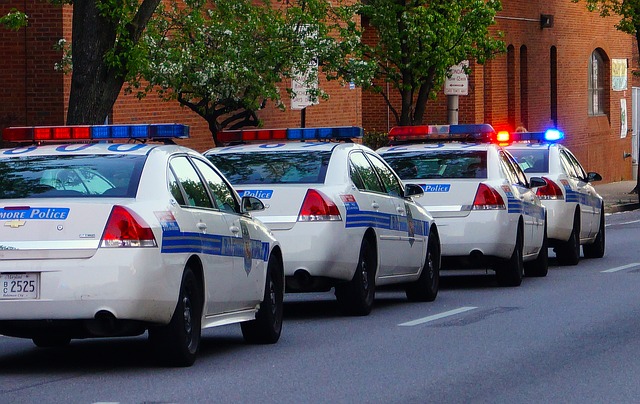 During the off-season Ocean City is a quiet beach town with a population of around ten thousand residents, and relatively low police activity. In the summer months though the town transforms into a bustling city of over 300,000. Most of the summer visitors come with family to enjoy Maryland’s famous 10-mile stretch of beach, but there’s also the crowd that comes with a different purpose. The nightlife along coastal highway is enough motivation for many to brave the Route 50 speed traps, or the stop and go traffic coming from Pennsylvania down through Delaware. As is usually the case, packed bars and party hungry tourists attract the attention of police officers. Some officers are simply out there to keep the peace, but others are hungry for some police action. The 100 plus “seasonal” officers that the town of Ocean City employs each summer to supplement the regular force would probably fall into the latter category. Thousands of partygoers plus an increased law enforcement presence makes it hardly a surprise that the OC Police recently conducted a major undercover drug operation.
During the off-season Ocean City is a quiet beach town with a population of around ten thousand residents, and relatively low police activity. In the summer months though the town transforms into a bustling city of over 300,000. Most of the summer visitors come with family to enjoy Maryland’s famous 10-mile stretch of beach, but there’s also the crowd that comes with a different purpose. The nightlife along coastal highway is enough motivation for many to brave the Route 50 speed traps, or the stop and go traffic coming from Pennsylvania down through Delaware. As is usually the case, packed bars and party hungry tourists attract the attention of police officers. Some officers are simply out there to keep the peace, but others are hungry for some police action. The 100 plus “seasonal” officers that the town of Ocean City employs each summer to supplement the regular force would probably fall into the latter category. Thousands of partygoers plus an increased law enforcement presence makes it hardly a surprise that the OC Police recently conducted a major undercover drug operation.
The undercover drug operation lasted throughout June and yielded 37 arrests. There were 23 controlled drug transactions between cops and unsuspecting dealers, which were used as evidence for distribution charges and other CDS offenses. Police also seized physical evidence including marijuana, cocaine, firearms and cash. Almost all of the defendants are from Maryland, though a few are Pennsylvania residents, and 6 of the 37 were arrested and charged as juveniles. The adult defendants range in age from 18 all the way to 46, but most are 23 or younger. All but three of the adults are facing felony charges that will likely be set for preliminary hearings in the Ocean City District Court sometime in August. Most of these cases will then be indicted or filed in the Worcester County Circuit Court over the next few weeks. Two of the cases are misdemeanor weapons charges and one is a disorderly conduct, which could be handled in the district court right in town.
This is definitely not the first, and will not be the last time Ocean City Police put together an organized undercover drug operation. Each summer there are dozens of drug arrests that involve an undercover cop posing as a party going tourist looking to get high. Most of these controlled deals involve a team of around four officers. One or two are usually dressed in street clothes, while another couple are watching or recording from a police car. The cops posing as potential buyers will typically meet their suspects in crowded areas such as the boardwalk, and then lure them onto the side streets to complete the deal. After the transaction is finished the uniformed officers will then jump out to make the arrest. In some instances police will not make an arrest right away, but will wait until the entire operation is over so as not to jeopardize the identity of the undercovers. But these situations are usually reserved for known dealers, and require a more patient approach that might not be practical to law enforcement in a tourist town. The Blog will follow these cases as they progress through the county courts, and may post a follow up article if necessary.
 Criminal Defense Lawyer Blog
Criminal Defense Lawyer Blog




 The shamed Baltimore City public school teacher charged with eleven theft crimes almost a year ago has now pled guilty to one count of felony theft scheme. This past week in the Circuit Court in downtown Baltimore a special statewide prosecutor announced the state would only pursue one of the counts in exchange for the guilty plea. The ex-principal will now avoid what would have been a lopsided trial, as the prosecutor had ample evidence connecting the defendant to almost $50,000 of missing school activity funds. The defendant, who is currently out on bail, was not sentenced at the plea hearing. Rather, sentencing has been set for early October on the one felony count that carries a maximum jail sentence of fifteen years. There is also the possibility of hefty fines and mandatory restitution for the charge, which is classified as theft scheme with a value of $10,000 to $100,000. This offense does not carry a minimum mandatory jail sentence, unlike the embezzlement count that was dropped.
The shamed Baltimore City public school teacher charged with eleven theft crimes almost a year ago has now pled guilty to one count of felony theft scheme. This past week in the Circuit Court in downtown Baltimore a special statewide prosecutor announced the state would only pursue one of the counts in exchange for the guilty plea. The ex-principal will now avoid what would have been a lopsided trial, as the prosecutor had ample evidence connecting the defendant to almost $50,000 of missing school activity funds. The defendant, who is currently out on bail, was not sentenced at the plea hearing. Rather, sentencing has been set for early October on the one felony count that carries a maximum jail sentence of fifteen years. There is also the possibility of hefty fines and mandatory restitution for the charge, which is classified as theft scheme with a value of $10,000 to $100,000. This offense does not carry a minimum mandatory jail sentence, unlike the embezzlement count that was dropped. The last couple of months have been quiet on the medical marijuana front, and as a result it did not take much of a pot story to produce headlines at a variety of Maryland news outlets. Last Friday a town planner for the Talbot County seat of Easton announced that the site of a former tool manufacturing plant would receive local zoning approval to become a marijuana growing facility. The planner decided that growing legal pot classifies as agriculture, which is proper in all areas of the Eastern Shore town, save for the historical downtown area. Keep in mind that this facility would strictly be for growing, and would have no dispensing capability, or relationship to any potential local dispensary. Whether this actually turns out to be a story of substance remains to be seen, as the growing company who pitched the town planner has not yet received a state license to grow medical pot. But all the downtime created by the Maryland Medical Marijuana Commission’s methodical pace has left the people and consequently the media in a jumpy mood; nearly any small development will make headlines at this point.
The last couple of months have been quiet on the medical marijuana front, and as a result it did not take much of a pot story to produce headlines at a variety of Maryland news outlets. Last Friday a town planner for the Talbot County seat of Easton announced that the site of a former tool manufacturing plant would receive local zoning approval to become a marijuana growing facility. The planner decided that growing legal pot classifies as agriculture, which is proper in all areas of the Eastern Shore town, save for the historical downtown area. Keep in mind that this facility would strictly be for growing, and would have no dispensing capability, or relationship to any potential local dispensary. Whether this actually turns out to be a story of substance remains to be seen, as the growing company who pitched the town planner has not yet received a state license to grow medical pot. But all the downtime created by the Maryland Medical Marijuana Commission’s methodical pace has left the people and consequently the media in a jumpy mood; nearly any small development will make headlines at this point. The FBI and the Montgomery County Police recently announced the break up of a large-scale drug ring operating out of a residential area near Rockville. Monday during the early morning hours, as many as 100 state, local and federal law enforcement officers raided numerous townhomes in the Bel Pre development, as well as a business in Prince George’s County. The raids yielded a narcotics, multiple firearms, and over $70,000 in cash. All told 18 people were arrested, and now the defendants face felony drug charges in federal court. All but one of the defendants resides in Maryland, with the non-resident being from Pennsylvania. The defendants are charged with conspiracy to distribute heroin and cocaine, and could face other charges based on the evidence that was seized.
The FBI and the Montgomery County Police recently announced the break up of a large-scale drug ring operating out of a residential area near Rockville. Monday during the early morning hours, as many as 100 state, local and federal law enforcement officers raided numerous townhomes in the Bel Pre development, as well as a business in Prince George’s County. The raids yielded a narcotics, multiple firearms, and over $70,000 in cash. All told 18 people were arrested, and now the defendants face felony drug charges in federal court. All but one of the defendants resides in Maryland, with the non-resident being from Pennsylvania. The defendants are charged with conspiracy to distribute heroin and cocaine, and could face other charges based on the evidence that was seized. News trucks and National Guard Humvees are no longer lining the streets of Baltimore, but the city is still experiencing elevated crime levels and widespread violence following riots that generated worldwide attention. Forty-two people were murdered within city limits last month, the highest monthly total in over 40 years, and millions of dollars worth of narcotics have fallen into the hands of drug dealers in the last few weeks. The murder rate is attributed by some as a direct result of a lower police presence in high crime areas, exactly the opposite of what is needed. Police in the tensest areas such as the western district of Baltimore City have allegedly shifted their priority to self-preservation rather than protecting the public. According to an anonymous supervising officer who was interviewed on CNN, cops in the western district are basically ignoring orders from the police leadership to vigorously patrol, and are just simply responding to 911 calls. This passive approach is likely causing a sense of lawlessness in certain areas, and in turn wrongdoers are becoming bolder. Although the police commissioner has no plans to step down, there is growing discontent about the department’s leadership going forward. One city councilman has publically called for a new police commissioner, stating that he knows rank and file officers have lost confidence and respect for their commander. This environment has officer moral and motivation at an all time low, and city residents are suffering the consequences.
News trucks and National Guard Humvees are no longer lining the streets of Baltimore, but the city is still experiencing elevated crime levels and widespread violence following riots that generated worldwide attention. Forty-two people were murdered within city limits last month, the highest monthly total in over 40 years, and millions of dollars worth of narcotics have fallen into the hands of drug dealers in the last few weeks. The murder rate is attributed by some as a direct result of a lower police presence in high crime areas, exactly the opposite of what is needed. Police in the tensest areas such as the western district of Baltimore City have allegedly shifted their priority to self-preservation rather than protecting the public. According to an anonymous supervising officer who was interviewed on CNN, cops in the western district are basically ignoring orders from the police leadership to vigorously patrol, and are just simply responding to 911 calls. This passive approach is likely causing a sense of lawlessness in certain areas, and in turn wrongdoers are becoming bolder. Although the police commissioner has no plans to step down, there is growing discontent about the department’s leadership going forward. One city councilman has publically called for a new police commissioner, stating that he knows rank and file officers have lost confidence and respect for their commander. This environment has officer moral and motivation at an all time low, and city residents are suffering the consequences. Toward the end of the 2015 legislative session the General Assembly convincingly passed a modification of the marijuana decriminalization law. The modification served to cure an inherent defect in the 2014 decriminalization law by removing the possession of marijuana paraphernalia from the catalog of CDS criminal offenses. It was a logical and necessary fix to the ambiguous situation created by the 2014 law, which punished the possession of pot only by a civil fine, yet still punished possession of the device used to ingest the pot with criminal sanctions. This modification was expected to take effect in October of this year, thus ending the ambiguity and giving law enforcement and prosecutors more time to deal with actual issues of public safety. The only hurdle was an approval from our recently sworn governor, which at the time seemed like a forgone conclusion. But this past week Hogan flexed his socially conservative muscle and vetoed the bill, baffling some lawmakers and angering marijuana reform advocates all over the country. So for at least another year, the only thing criminal about smoking a joint Maryland is the rolling paper that keeps it together.
Toward the end of the 2015 legislative session the General Assembly convincingly passed a modification of the marijuana decriminalization law. The modification served to cure an inherent defect in the 2014 decriminalization law by removing the possession of marijuana paraphernalia from the catalog of CDS criminal offenses. It was a logical and necessary fix to the ambiguous situation created by the 2014 law, which punished the possession of pot only by a civil fine, yet still punished possession of the device used to ingest the pot with criminal sanctions. This modification was expected to take effect in October of this year, thus ending the ambiguity and giving law enforcement and prosecutors more time to deal with actual issues of public safety. The only hurdle was an approval from our recently sworn governor, which at the time seemed like a forgone conclusion. But this past week Hogan flexed his socially conservative muscle and vetoed the bill, baffling some lawmakers and angering marijuana reform advocates all over the country. So for at least another year, the only thing criminal about smoking a joint Maryland is the rolling paper that keeps it together. Drug and alcohol related deaths have increased statewide over the past few years, and the jump from 2013 to 2014 was so significant that the governor has declared a health crisis in Maryland. The state health department recently released its annual report for this past year, and the numbers are frightening to say the least. Over 1,000 people died directly from drug and alcohol overdoses last year, which represents a 21 percent increase from 2013. More than half of those deaths were the result of heroin, a narcotic whose popularity has been increasing exponentially over the past decade. In his first year of office, Governor Hogan has made it a priority to combat drug overdoses, and he has taken proactive measures such as approving a bill expanding the use of Naloxone, an opioid antagonist that reverses the effects of heroin. Many police officers statewide, including those in Anne Arundel County, now carry this powerful life saving drug. Chances are that more departments will add it to their officer’s essential police equipment in the future. Ultimately though, the governor’s focus will be on breaking up heroin trafficking rings, and on educating the youth about the dangers of even one single dose this dangerous drug.
Drug and alcohol related deaths have increased statewide over the past few years, and the jump from 2013 to 2014 was so significant that the governor has declared a health crisis in Maryland. The state health department recently released its annual report for this past year, and the numbers are frightening to say the least. Over 1,000 people died directly from drug and alcohol overdoses last year, which represents a 21 percent increase from 2013. More than half of those deaths were the result of heroin, a narcotic whose popularity has been increasing exponentially over the past decade. In his first year of office, Governor Hogan has made it a priority to combat drug overdoses, and he has taken proactive measures such as approving a bill expanding the use of Naloxone, an opioid antagonist that reverses the effects of heroin. Many police officers statewide, including those in Anne Arundel County, now carry this powerful life saving drug. Chances are that more departments will add it to their officer’s essential police equipment in the future. Ultimately though, the governor’s focus will be on breaking up heroin trafficking rings, and on educating the youth about the dangers of even one single dose this dangerous drug. The FBI recently concluded a two-year investigation of five Baltimore City public works employees, and now two face bribery charges in the United States District Court. The other three face theft and conspiracy charges, which are charged under a similar federal law. Cell phone wiretaps ultimately led to a raid in which federal authorities confiscated physical evidence to aid U.S. attorneys in proving their case against the five. One of the male defendants has been charged with conspiracy to solicit bribes concerning a program receiving federal funds and the only female defendant has been charged with the same, plus an additional count of bribery. The other three males are charged with conspiracy to steal from a program receiving federal funds and with theft.
The FBI recently concluded a two-year investigation of five Baltimore City public works employees, and now two face bribery charges in the United States District Court. The other three face theft and conspiracy charges, which are charged under a similar federal law. Cell phone wiretaps ultimately led to a raid in which federal authorities confiscated physical evidence to aid U.S. attorneys in proving their case against the five. One of the male defendants has been charged with conspiracy to solicit bribes concerning a program receiving federal funds and the only female defendant has been charged with the same, plus an additional count of bribery. The other three males are charged with conspiracy to steal from a program receiving federal funds and with theft.